You are here: Home>Articles>Baha’i Belief and Courtesy: Baha’u’llah Refers to Those that Deny Him as Pigs, Donkeys, and Dogs
Courtesy and politeness are moral and ethical values that all true Prophets and messengers of God advocate and abide too. Baha’is claim that their leader Baha’u’llah, has put a great emphasis on this topic and cite quotes from him such as:
“O people of God! I admonish you to observe courtesy, for above all else it is the prince of virtues. Well is it with him who is illumined with the light of courtesy and is attired with the vesture of uprightness. Whoso is endued with courtesy hath indeed attained a sublime station.” (Baha’u’llah, Tablets of Baha’u’llah Revealed After the Kitab-i-Aqdas, p. 88)
The question is: was Baha’u’llah a courteous man himself and referred to other people with courtesy and politeness?
1- Instances where Baha’u’llah refers to his deniers as donkeys
Baha’u’llah refers to those who denied him and his enemies as pigs, donkeys, and dogs. He calls the followers of the Bab who refused to acknowledge him donkeys:
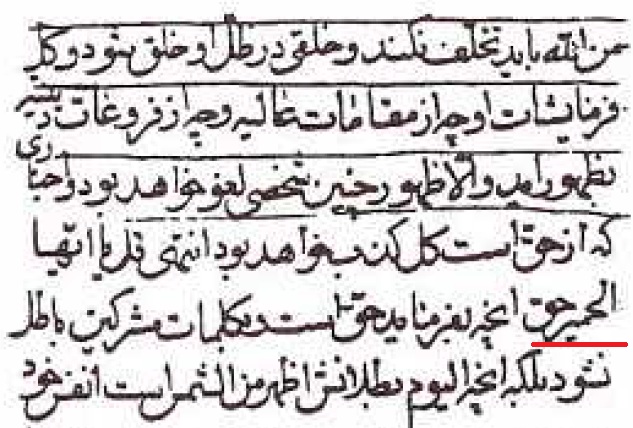
«قل یا ایها الحمیر حق آنچه بفرماید حق است و بکلمات مشرکین باطل نشود»
“Say, Oh you donkey! Whatever God says is the truth and will not become void by the words of the polytheists (deniers of Baha’ism).” (Baha’u’llah, Kitab-i badi`, p. 174)
There are numerous other instances where he refers to other people using the same derogatory term. In another case, he gives a Baha’i the following advice and insults Muslim scholars by calling them donkeys with large turbans:
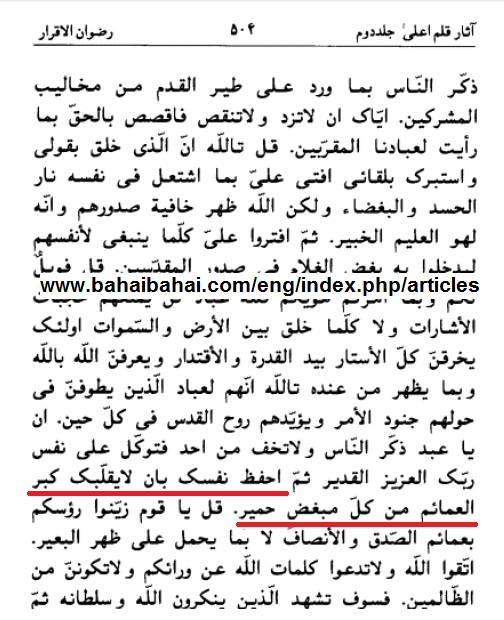
«احفظ نفسک بان لا یقلّبک کبر العمائم من کلّ مبغضٍ حمیر»
“Protect yourself so that from the donkey enemies, those with large turbans do not turn you away from (Baha'ism)...” (Baha’u’llah, Athar-i Qalam-i A`la, vol. 2, no. 83, p. 504)
In another instances he tells one of his deniers:
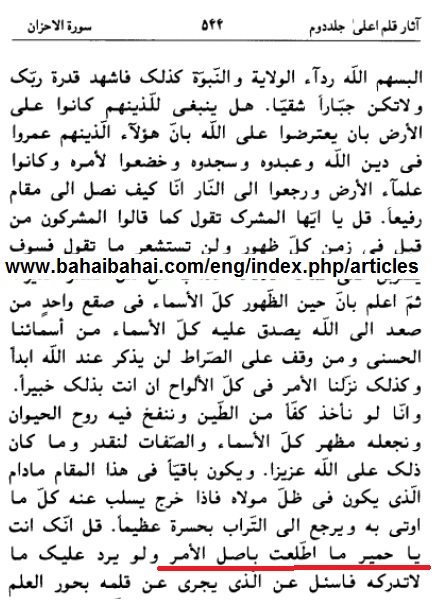
«قل انّک انت یا حمیر ما اطّلعت باصل الامر»
“Say: verily you, you donkey, have not attained the truth regarding this matter” (Baha’u’llah, Athar-i Qalam-i A`la, vol. 2, no. 86, p. 544)
He tells the same person that he has been turned into a donkey by Bah’au’llah’s spirit:
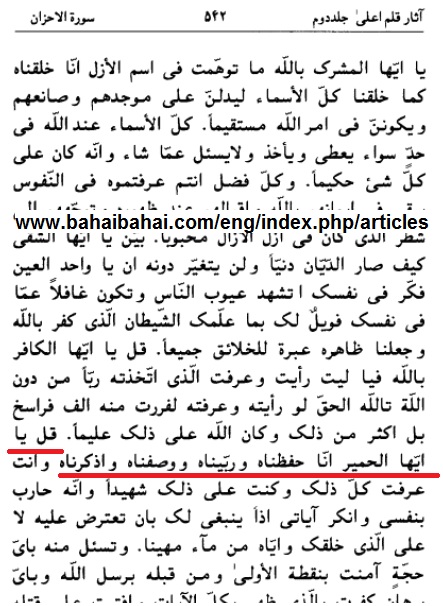
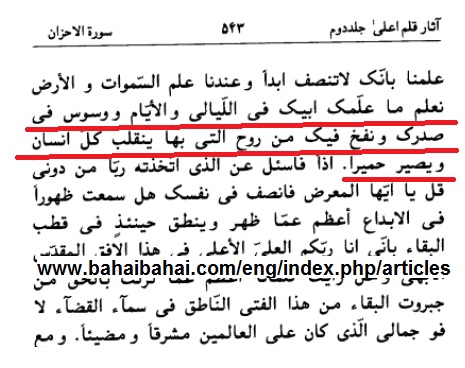
«قل یا ایها الحمیر انّا حفظناه و ربّیناه و وصفناه و اذکرناه ... نعلم ما علّمک ابیک فى اللّیالی و الایام و وسوس فى صدرک و نفخ فیک من روحى الّتى بها ینقلب کلّ انسانٍ و یصیر حمیرا»
"Say, Oh you donkey! We protected him and nurtured him and praised him and remembered him… we know what your father taught you in the nights and days. He whispered into your breast and blew into you from my spirit that transforms all men into donkeys." (Baha’u’llah, Athar-i Qalam-i A`la, vol. 2, no. 86, p. 542-3)
2- Instances where Baha’u’llah refers to his deniers as animals and dogs
Baha’u’llah would frequently call his deniers and enemies animals. Pay attention to the following quotes:
“Encompassed as I am at this time by the dogs of the earth and the beasts of every land, concealed as I remain in the hidden habitation of Mine inner Being.” (Baha’u’llah, Gems of Divine Mysteries, p. 4)
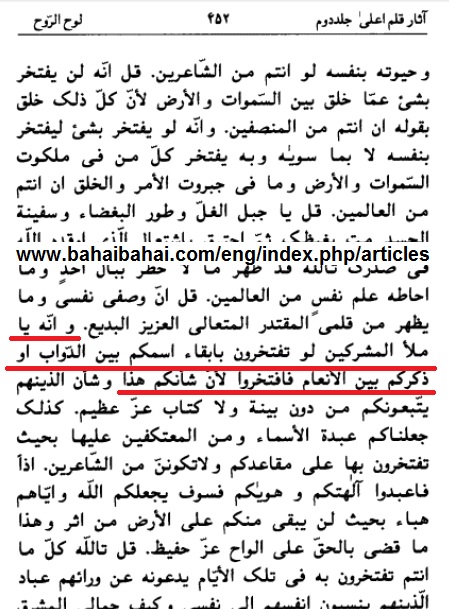
«یا ملأ المشرکین لو تفتخرون بابقاء اسمکم بین الدّواب او ذکرکم بین الانعام فافتخروا لانّ شأنکم هذا»
“O group of polytheists (deniers of Baha’ism), if you take pride in your name remaining amongst the animals or being mentioned amongst the livestock, then take pride in that for you are worthy of it.” (Baha’u’llah, Athar-i Qalam-i A`la, vol. 2, no. 81, p. 452)
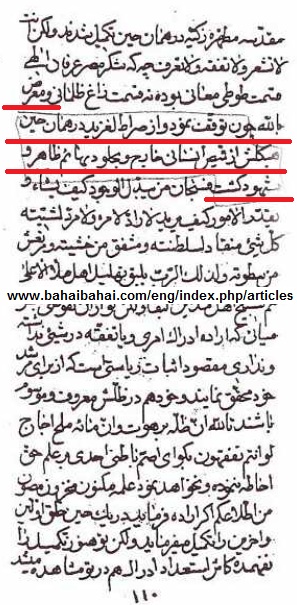
«معرض بالله چون توقف نمود و از صراط لغزید در همان حین هیکلش از قمیص (لباس) انسانی خارج و بجلود بهائم (در پوست چهارپایان) ظاهر و مشهود گشت.»
“When the one who turned away from God halted (in accepting me) and fell off the path, in that moment his body left the garb of humanness and appeared and became visible in the skin of animals. Sanctified is He who changes the beings how he likes.” (Baha’u’llah, Kitab-i badi`, p. 110)
Baha’u’llah goes as far as telling his followers that if they refer to his deniers as humans [update: or 'hummanness' which is obviusly wrong from a grammatical viewpoint. If a more suitable translation can be provided this will be updated], he would deprive them of God’s graces:
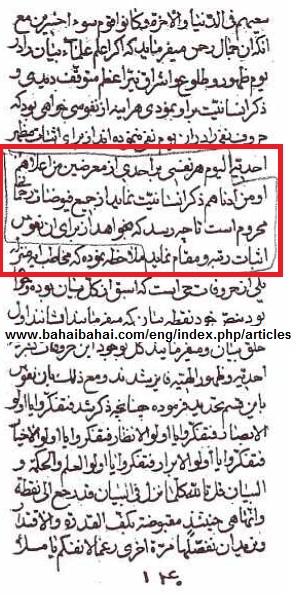
«الیوم هر نفسی بر احدی از معرضین من اعلاهم او من ادناهم ذکر انسانیت نماید، از جمیع فیوضات رحمانی محروم است؛ تا چه رسد که بخواهد از برای آن نفوس اثبات رتبه و مقام نماید.»
“From this day, any individual that mentions as human [or humanness] a single person from those who deny me—whether that [denier] has a high or low stature—they will be excluded from all of (God’s) Merciful Graces, let alone trying to prove [those deniers] have dignity or stature.” (Baha’u’llah, Kitab-i badi`, p. 140)
3- Instances where Baha’u’llah refers to his deniers as pigs
In the midst of criticizing a person by the name of Shaykh Abdu’l-Husayn, Baha’u’llah refers to him as a pig and says:
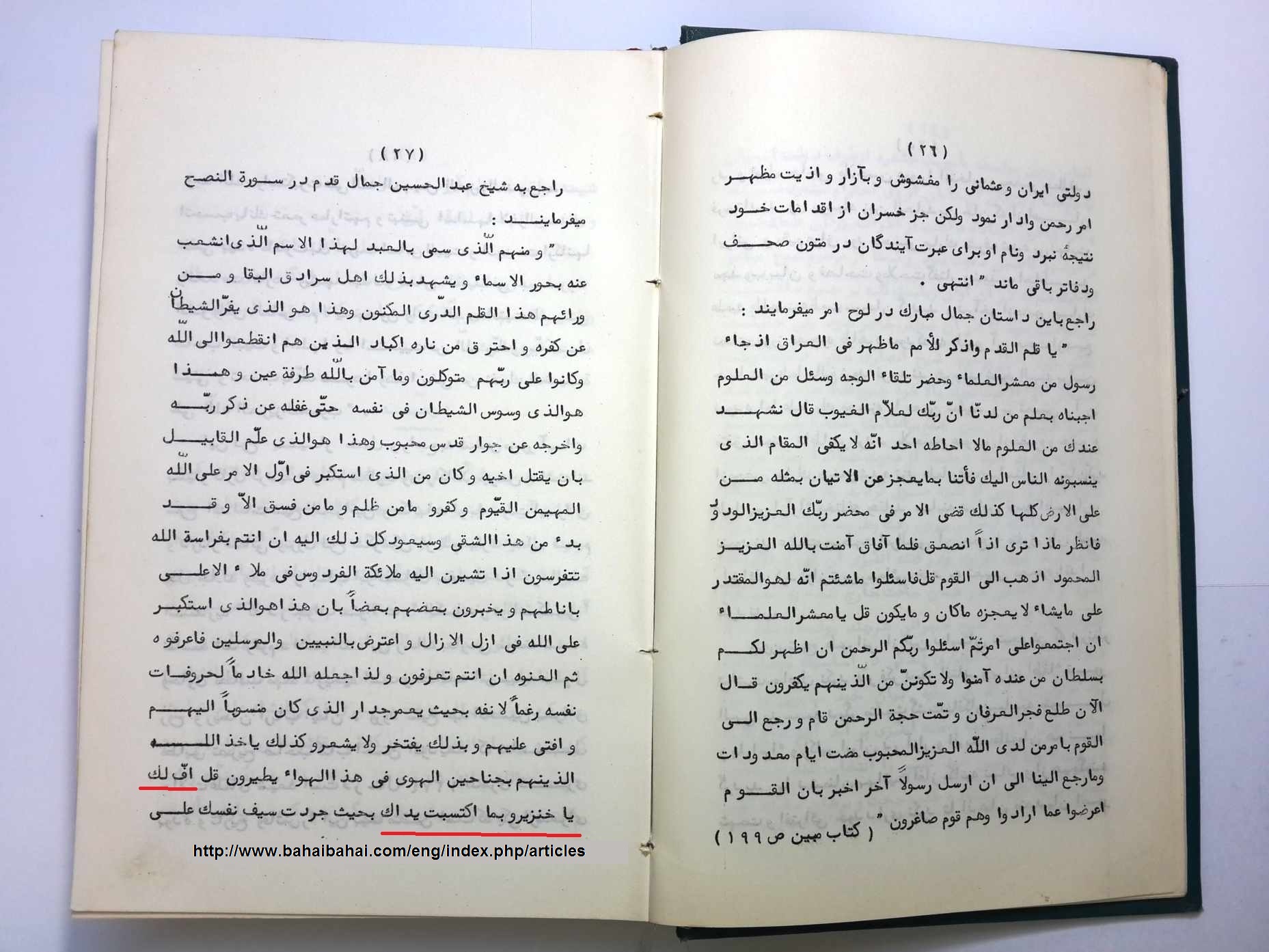
“اف لک یا خنزیر و بما اکتسبت یداک”
“Woe unto you pig for what you have committed.” (Abdu’l-Hamid Ishraq Khavari, Rahiq-i makhtum, vol. 2, p. 27)
In a letter to Sayyid Mahdi of Dahaj, Baha’u’llah refers to the words of Mirza Yahya Subh-i Azal and his followers using these words:
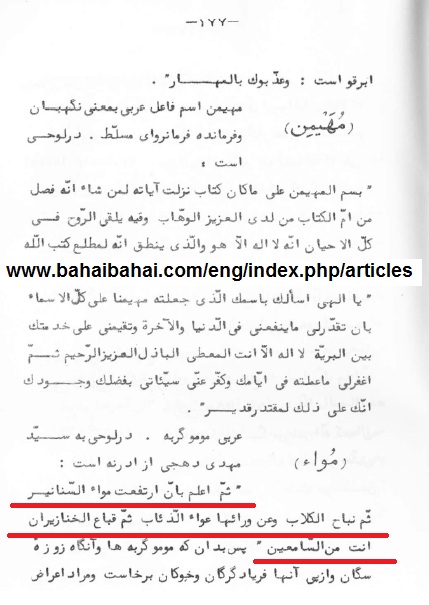
«ثم اعلم بان ارتفعت مواء السنانیر ثم نباح الکلاب و عن ورائها عواء الذهاب ثم قباع الخنازیر»
“Know that the meowing of cats, the barking of dogs and beyond that the howling of wolves and grunting of pigs has risen.” (Fadil Mazandarani, Asrar al-athar, vol. 5, p. 177)
4- Instances where Baha’u’llah refers to his deniers as bastards
In one of his writings Baha’u’llah states that deniers of Baha’ism should ask their state from their mother’s, which is a phrase used in Persian/Arabic to imply that someone is a bastard:
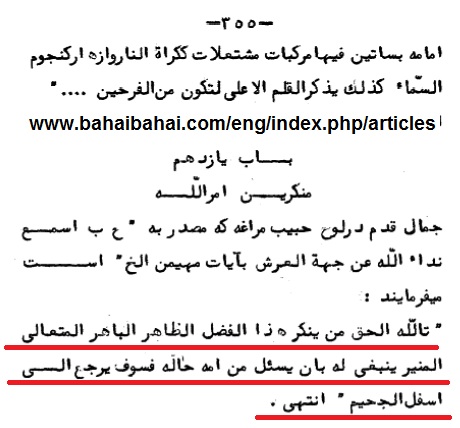
«من ینکر هذا الفضل الظاهر الباهر المتعالی المنیر ینبغی له بان یسئل عن امه حاله فسوف یرجع الی اسفل الجحیم»
“Whoever denies this apparent exalted luminous grace (meaning Baha’ism), it is worthy that he asks his state from his mother and he will soon be returned to the bottom of hell,” Ishraq Khavari, Ma’idiy-i asimani, vol. 4, p. 355;
In another instance, he utters a similar sentence but this time states that Satan has slept with the deniers mother:
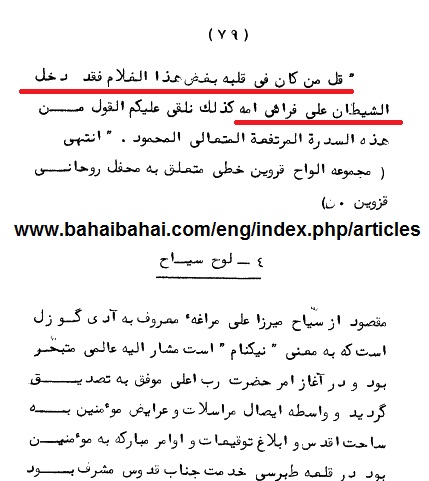
«قل من کان فی قلبه بغض هذا الغلام (بهاء) فقد دخل الشیطان علی فراش امه»
“Whoever has the enmity of this servant (meaning Baha’u’llah) in his heart, certainly Satan has entered their mother’s bed,” Ishraq Khavari, Ganj-i shaygan, p. 79.
All the aforementioned statements were uttered by the same Baha’u’llah that would claim:
“We, verily, have chosen courtesy, and made it the true mark of such as are nigh unto Him. Courtesy, is, in truth, a raiment which fitteth all men, whether young or old. Well is it with him that adorneth his temple therewith, and woe unto him who is deprived of this great bounty.” (Baha’u’llah, Proclamation of Baha’u’llah, p. 20)
The same Baha’u’llah that would preach:
“Verily I say, the tongue is for mentioning what is good, defile it not with unseemly talk. God hath forgiven what is past. Henceforward everyone should utter that which is meet and seemly, and should refrain from slander, abuse and whatever causeth sadness in men.” (Baha’u’llah, Kitab-i Aqdas)
And the same Baha’u’llah that would speak these words:
“Ascribe not to any soul that which thou wouldst not have ascribed to thee, and say not that which thou doest not. This is My command unto thee, do thou observe it.” (Baha’u’llah, The Hidden Words of Baha’u’llah, p. 52)
Is Baha’u’llah willing to ascribe the aforementioned statements to himself? If not why does he ascribe them to others?
Baha’is deem it appropriate for their leader to refer to those that deny him as animals, pigs, dogs, donkeys, and bastards. How will they react if a non-Baha’i calls a Baha’i a pig, dog, or donkey?
In some cases when Baha’is want to justify these words, they claim using fallacious arguments, that since similar statements might be found in the scriptures of other faiths, Baha’u’llah was also justified in using this kind of inappropriate terminology! We will not comment on those statements and the fallacies Baha’is use. Instead, we will show using Baha’i scripture that such arguments are completely invalid, because according to Abdu’l-Baha, the Baha’i teachings are such that unlike all religions, faiths, and creeds, the enemies and deniers of Baha’ism are to be treated with great respect and under no condition must they be insulted or referred to using profanities:
“The divine principles in this luminous era are such that one must not insult anyone,” Abdu’l-Baha, Makatib, vol. 1, p. 355.
“In every dispensation, there hath been the commandment of fellowship and love, but it was a commandment limited to the community of those in mutual agreement, not to the dissident foe. In this wondrous age, however, praised be God, the commandments of God are not delimited, not restricted to any one group of people, rather have all the friends been commanded to show forth fellowship and love, consideration and generosity and loving-kindness to every community on earth . . . The meaning of this is that ye must show forth tenderness and love to every human being, even to your enemies, and welcome them all with unalloyed friendship, good cheer, and loving-kindness. When ye meet with cruelty and persecution at another’s hands, keep faith with him; when malevolence is directed your way, respond with a friendly heart. To the spears and arrows rained upon you, expose your breasts for a target mirror-bright; and in return for curses, taunts and wounding words, show forth abounding love.” (Abdu’l-Baha, Selections From the Writings of Abdu’l-Baha, no. 7, pp. 20-22)
"From the beginning of human history down to the present time the various religions of the world have anathematized and accused each other of falsity. Each religion has considered the others bereft of the face of God, deprived of His mercy and in the direct line of divine wrath. Therefore, they have shunned each other most rigidly, exercising mutual animosity and rancor ... Each one of the divine religions considers itself as belonging to a goodly and blessed tree, the tree of the Merciful, and all other religious systems as belonging to a tree of evil, the tree of Satan. For this reason they heap execration and abuse upon each other. This is clearly apparent in books of historical record and prevailed until the time of the appearance of Bahá’u’lláh. When the light of Bahá’u’lláh dawned from the East, He proclaimed the promise of the oneness of humanity. He addressed all mankind, saying, “Ye are all the fruits of one tree. There are not two trees: one a tree of divine mercy, the other the tree of Satan.” Again He said, “Ye are all the fruits of one tree, the leaves of one branch.” This was His announcement; this was His promise of the oneness of the world of humanity. Anathema and execration were utterly abrogated. He said, “It is not becoming in man to curse another; it is not befitting that man should attribute darkness to another; it is not meet that one human being should consider another human being as bad; nay, rather, all mankind are the servants of one God; God is the Father of all; there is not a single exception to that law. There are no people of Satan; all belong to the Merciful. There is no darkness; all is light. All are the servants of God, and man must love humanity from his heart. He must, verily, behold humanity as submerged in the divine mercy . . . Bahá’u’lláh has clearly said in His Tablets that if you have an enemy, consider him not as an enemy. Do not simply be long-suffering; nay, rather, love him. Your treatment of him should be that which is becoming to lovers. Do not even say that he is your enemy. Do not see any enemies. Though he be your murderer, see no enemy. Look upon him with the eye of friendship. Be mindful that you do not consider him as an enemy and simply tolerate him, for that is but stratagem and hypocrisy. To consider a man your enemy and love him is hypocrisy. This is not becoming of any soul. You must behold him as a friend. You must treat him well. This is right." Abdu’l-Baha, The Promulgation of Universal Peace, pp. 265–267.
“in all religious teachings of the past the human world has been represented as divided into two parts: one known as the people of the Book of God, or the pure tree, and the other the people of infidelity and error, or the evil tree. The former were considered as belonging to the faithful, and the others to the hosts of the irreligious and infidel—one part of humanity the recipients of divine mercy, and the other the object of the wrath of their Creator. Bahá’u’lláh removed this by proclaiming the oneness of the world of humanity, and this principle is specialized in His teachings, for He has submerged all mankind in the sea of divine generosity.” (Abdu’l-Baha, The Promulgation of Universal Peace, p. 454.)
Once one delves into Baha’i scripture, specially the statements of Baha’u’llah that have not been translated into English to date, it becomes apparent that the teachings of Baha’ism are in no wise compatible with how they are advertised today.
Baha’i faith, Baha’i cult, Baha’ism, Bahai, Baha’u’llah, Kitab-i-Aqdas, Curse, Subh-i-Azal, Mirza Yahya Subh-I Azal, Hypocrisy, Twelve Baha'i Principles, 12 Baha'i principles, Baha'i teachings, Baha'i Principles, Baha'i beliefs, Baha’i, Baha’u’llah, Abdu’l-Baha, the Bab, Shoghi, Independent Investigation of the Truth, Oneness of the World of Humanity,Religion Must Be the Source of Unity, Religion must be in accord with Science and Reason, Removal of all Prejudice, Spiritual Solution of the Economic Problem, Establishment of the Universal House of Justice, Universal Compulsory Education, Universal Language, Equality of Men and Women, Universal Peace, Humanity Is in Need of the Blessings of the Holy Spirit, Mirza Husayn Ali Nuri, Mirza Hossein Ali Noori, Baha’u’llah, Bahaullah, `Abdu'l-Baha, Abd al-Baha, Shoghi Effendi, Baha’ism, Bahaism, Baha'i, Bahai, Babism, The Bab, The Guardian, Universal House of Justice, UHJ, Comprehensive analysis of the twelve Baha'i principles, Shaykhi, Bayani, Bayan, Azali, Mason Remey, Orthodox Baha'i, Ali Muhammad Bab, Sayyid Kazim Rashti, Ruhi, Edward Browne, Manifestation of God, God Passes By, A Traveler's Narrative, Abdu'l-Baha in London, Bahai World Faith, Foundations of World Unity, Memorial of the Faithful, Paris Talks, Selection from the writings of Abdu'l-Baha, Some answered Questions, Tablet to August Forel, Tablets of Abdu'l-Baha, Tablets of the Divine Plan, The Promulgation of Universal Peace, The Secret of Divine Civilization, The Will and Testament of Abdu'l-baha, Epistle to the Son of the Wolf, Gems of Divine Mysteries, Gleanings from the Writing of Bahaullah, Prayers and Meditations by Bahaullah, Proclamation of Bahaullah, Tablets of Bahaullah Revealed after the kitab Aqdas, The Hidden Words of Bahaullah, The kitab i Iqan, The book of Iqan, Iqan, The Seven Valleys and the Four Valleys, The Summons of the Lord of Hosts, The Tabernacle of Unity, Bahai Prayers A Selection of Prayers Revealed by Bahaullah the Bab and Abdu'l-Baha, Compilation on Bahai Education, Compilation on Peace, Compilation on Women, Compilation on Scholarship, Japan Will Turn Ablaze, Bahaiyyih khanom, Baha'u'llah and New Era, The Dawn Breakers, Arohanui Letters from shoghi Effendi to New Zealand, Bahai Administration, Citadel of Faith, Dawn of a New Day, Directives From the Guardian, God Passes By, High Endeavours Messages to Alaska, Letters from the Guardian to Australia and New Zealand, Message to Canada, Message to the Bahai World 1950-1957, Messages to America, The Advent of Divine Justice, The Light of Divine Guidance, The Promised Day is Come, The World Order of Bahaullah, Unfolding Destiny, Persian Bayan, Arabic Bayan, Selections from the Writing of the Bab, Century of Light, One Common Faith, Statement on Baha'u'llah, The Promise of World Peace, The Prosperity of Humankind, Baha’i cult, Baha’i faith

 Abdu'l-Baha:
Abdu'l-Baha:

Comments (admin@bahaibahai.com)
Really, to read your article made me sad. The teachings of Bahá’u’lláh are the Road to Peace in the World. Please study them. In front of His copious luminous writings, your picking of words out of context is pitiful.
Anybody can pick words or situations in any religion, including Islam to denigrate it. Doing that will only conduce to the shedding of blood as history and the present condition of the world is telling us.
What you refer to as Baha'u'llah's "copious luminous writings" are simply a handful of cherry-picked quotes engineered for a western audience that show an extremely biased view of Baha'ism. The suppressed texts that we have provided here, show the true nature of Baha'u'llah and Abdu'l-Baha.